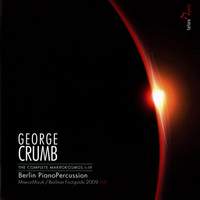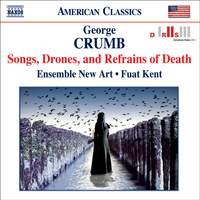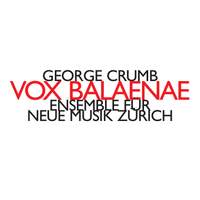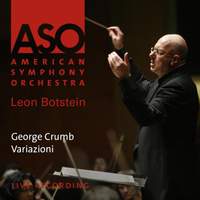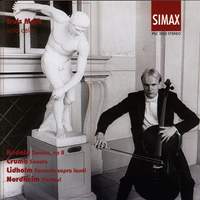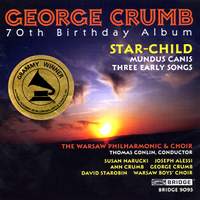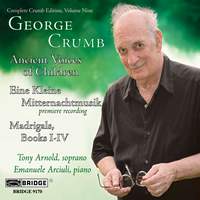Obituary,
George Crumb (1929-2022)
 The American composer George Crumb has died at the age of 92. Born in West Virginia to musician parents, the whole of Crumb’s life from his earliest years was focused on music – experimenting with composition as a child, attending the National Music Camp, majoring in music in Illinois, and pursuing further study in the subject in Berlin.
The American composer George Crumb has died at the age of 92. Born in West Virginia to musician parents, the whole of Crumb’s life from his earliest years was focused on music – experimenting with composition as a child, attending the National Music Camp, majoring in music in Illinois, and pursuing further study in the subject in Berlin.
Initially influenced by Webern, his reputation as an avant-garde composer in his own right soon began to be shaped above all by his interest in timbre; for Crumb, timbre was as important an element of music as the traditional core components of rhythm, harmony and counterpoint. Almost all his works include extended techniques or make unorthodox demands on the performers; instrumentalists or vocalists being called on to double as percussionists, for instance, is a recurring theme. These expansions of the sonic palette are always integral to, and in the service of, the music, rather than coming as an afterthought or a novelty. In 2017, looking back over Crumb’s career, VAN Magazine’s William Dougherty perceptively identified him as creating “a timbrally rich sound-world unlike any of his contemporaries.”
The increasing interconnectedness of the world that Crumb observed over his lifetime led him to identify the first stirrings of what he predicted would become a unified – and unifying – global musical culture. For the first time in history, composers from all over the world had access to, and could be influenced by, musical traditions from cultures geographically distant from their own, and Crumb along with many of his contemporaries drew on this new vein of inspiration richly.
The 1970s saw him produce some of his most acclaimed, and best-known, works; 1970’s Black Angels, for electric string quartet (enhanced by percussion and vocal interjections), is a thematically wide-ranging work responding in part to the Vietnam War. Drawing on eclectic influences including the Dies Irae chant, Schubert’s Death and the Maiden and the tradition of the viol consort, its premiere directly inspired the formation of the Kronos String Quartet (pioneers to this day of contemporary classical music), and the work was also hailed as an influence by the art rocker David Bowie.
Ancient Voices of Children, from the same year, is emblematic of Crumb’s enduring interest in setting the texts of the Spanish writer Federico García Lorca. A virtuosic, demanding song-cycle with ritualistic semi-staged elements, its sheer musical power is sometimes overshadowed by the distractingly innovative technique for which it has become famous, calling for the singer to sing into the open lid of the piano with the sustain pedal held down, to create an echo effect.
1971 saw the chamber work Vox Balaenae - small in scale, for just three performers, but intimidatingly vast in scope. Inspired by recordings of the songs of humpback whales, its sections are named after entire periods in the Earth’s four-billion-year biological and geological history, and the performance directions extend even beyond the realm of sound, as Crumb specifies that the musicians should wear black half-masks and ideally perform under blue lighting.
Arguably the most ambitious of all his works, however, was 1977’s Star-Child - a cosmically-conceived work for large ensemble dealing with deep, sweeping themes of light overcoming darkness – and drawing strongly, if sometimes obliquely, on Christian scriptures. A further development of this interest in the spiritual can also be heard in the Messiaen-esque suite of meditations on the Christmas story (A Little Suite For Christmas, A.D.1979, for solo piano); here, unusually, Crumb aligns quite closely with the kind of Christian subject matter that he more commonly treated at arm’s length.
A relative hiatus for several decades (though Crumb certainly never stopped composing entirely) was decisively ended in the 2000s, when the American Songbook began to take form; originally conceived as a four-volume series of arrangements of American popular vocal music of all genres, it had expanded into seven by his death, alongside the three-volume Spanish Songbook - incorporating familiar Crumb features such as the addition of percussionists, amplification, and hugely extended musical techniques.
The legacy of George Crumb as both composer and teacher is extensive and far-reaching. Performances of his music have inspired the inception of entire new ensembles, and rippled out into the arena of pop music, while composers as diverse as Uri Caine, Jennifer Higdon and Osvaldo Golijov have been influenced by his musicmaking. His memorable definition of music as “a system of proportions in the service of spiritual impulse” remains to this day a profound and thought-provoking comment on the very meaning of music as a concept – an enquiry that his entire life was dedicated to pursuing fearlessly and tirelessly.
George Crumb - a selected discography
Berlin PianoPercussion
Available Formats: MP3, FLAC
Ensemble New Art, Fuat Kent
Available Formats: CD, MP3, FLAC
Ensemble für Neue Musik Zürich
Available Formats: CD, MP3, FLAC
American Symphony Orchestra, Leon Botstein
Available Formats: MP3, FLAC
Truls Mørk (cello)
Available Formats: CD, MP3, FLAC
Susan Narucki (soprano), Joseph Alessi (trombone), Warsaw Philharmonic Orchestra, Warsaw Philharmonic Choir, Warsaw Boys Choir, Thomas Conlin
Available Formats: CD, MP3, FLAC
Tony Arnold (soprano), Justin Murray (boy soprano), Courtney Hershey Bress (harp), Susan Grace (piano), John Kinzie, Mark Foster, William Hill (percussion), Kathryn Dupuy Cooper (oboe), David Starobin (mandolin), Dale Stuckenbruck (musical saw), David Colson
Available Formats: CD, MP3, FLAC


